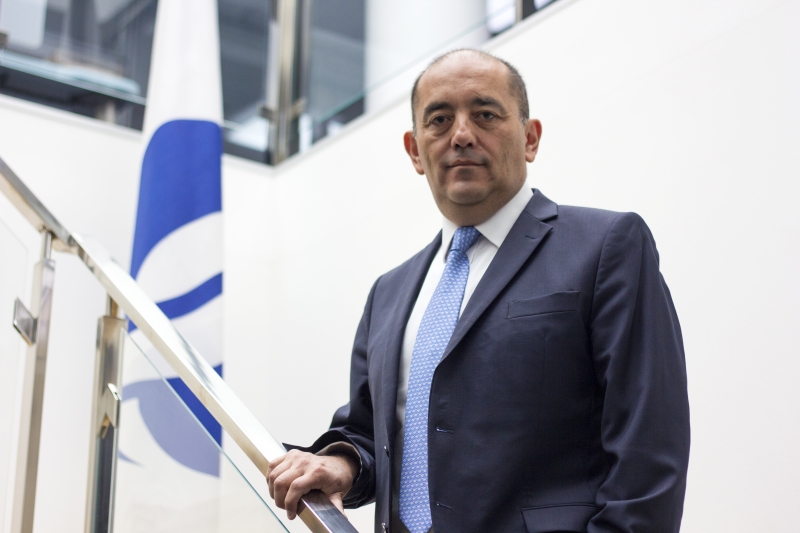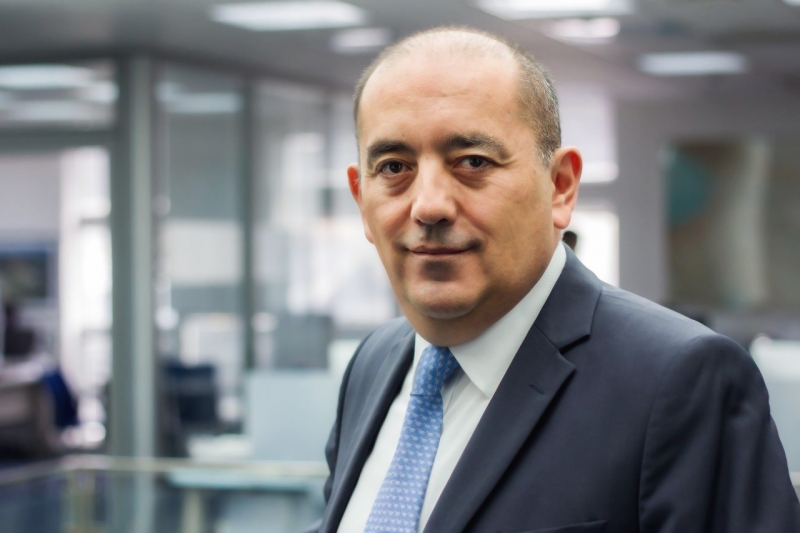Growing economy and increasing political stability make Bruno Balvanera, the EBRD’s director for Caucasus, Moldova & Belarus, confident that Georgia is heading in the right direction. He met Andrew Wrobel in the Georgian capital, Tbilisi.
So Europe’s Second Wave?
Yes, a couple of weeks ago Suma Chakrabarti, the EBRD President, was here in Tbilisi. He said, “Georgia is leading the second wave of countries moving into the western economy.” What he meant is that if the first wave comprised the nations of Central Europe, like Poland, the Czech Republic and Slovakia, countries which are all now well advanced, then the second wave is those who are trying right now to insert themselves into the market economy. And Georgia is clearly a country that is ahead of the rest.
The EBRD’s investments and activities in Georgia are, per capita, amongst the largest of all the countries in which we operate. We have committed around three billion euros for a country of 3.7 million people. So we’re talking about 850-900 euros per person. It’s one of the highest, if not the highest, in the region.

And where’s the money going?
Our activities are divided across all sectors, but I want to highlight in particular the banking sector, where we have really helped the creation of the two largest banks, TBC and Bank of Georgia. We helped them significantly through the combined crises of 2008, the August war in Georgia and the Lehman Brothers bankruptcy in September.
The banks required rapid capitalisation, and we helped them with that. We have of course been working with other banks, but these are the two largest banks in the country and we have supported them with equity and credit lines to support SMEs, women in business, energy efficiency and, more recently adaptation, of Deep and Comprehensive Free Trade Agreement (DCFTA) standards.
The second big sector is energy, and we have been supporting many hydropower plants in the country. Whether they are small, medium or large, we’re basically the biggest player in hydro and we have also expanded into wind. We’re now moving into solar power as well.
The third key area is dealing directly with major Georgian companies, whether in steel or in retail, or, more recently, in health, pharmacy and hospitals.
Finally, in infrastructure, we have so far perhaps not been as important as other IFIs — such as the ADB or EIB or the World Bank — but we have supported some infrastructure in the area of wastewater, solid waste, and more recently in public transportation. Anyone visiting Tbilisi can see the new blue buses all over the city: these are part of the energy efficiency programme we are working on, part of a wider programme called Green Cities, where we want to adopt more sustainable development of the cities.
It’s more than just money though, isn’t it? Part of the EBRD’s remit is structural.
The Investors’ Council, for example, is a platform where we have put together the representatives of the business associations, local and foreign. We have also brought together the key Government ministers, headed by Prime Minister Kvirikashvili, and the local representatives of the International Financial Institutions — including the World Bank, IFC, and Asian Development Bank, and us — and this is a structured way for the private sector to get together to discuss key issues with the public sector.
We have also been very actively involved in energy efficiency, most recently coming up with an Energy Efficiency Action Plan that is going to lay the groundwork for reductions in the consumption of energy. We have been very much involved in agribusiness and agricultural production, focusing on dairy, meat and horticulture. In addition, we have been leading efforts to create a new concession law, the PPP laws and now we’re moving towards proposing some different strategies on how to charge for the use of the roads. We have been at the forefront of capital market development, particularly issuing local bonds.
Most recently, we have started to engage on preparing a mining policy for Georgia. There are large copper mines in Georgia that can contribute to GDP of the country. We are also very supportive of the reform of the judicial sector; we have facilitated the establishment of the competition agency, worked public procurement policy; while probably the most creative innovation in this area is Blockchain. Georgia is one of the first countries in the world to use Blockchain technology to register property.
If Georgia is indeed the leader of the Second Wave, what is it that is driving that leadership? What makes Georgia stand out?
I think the most important things are the commitment, the vision and the strategy of the government, and that the government is elected democratically in a transparent way. The current government won a big majority in the last elections. This size of the majority was an endorsement of what the same government did during its first term in office.
For historic reasons, Georgia is more closely linked to Europe, and you can see that in the people. Georgia is clear about its orientation: European and North Atlantic. The country has very strong ties with Europe, very strong ties with the US and clearly has a vision of its future lying very much in that direction.
Georgia has been exposed to several different cultural influences, and has been able to develop its own distinct identity and has chosen its own path. In the 1990s, Georgia, immediately after the collapse of the Soviet Union, was in trouble. It was basically a failed state. There was no rule of law, not even any electricity. I think this created a lot of unhappiness amongst the population, and at some time they took the opportunity to look for a leader who was ready to say, “We’re going to change this.” And he did. He got everybody around him, and there was a very strong determination to clean up, starting with the police. He sacked 40,000 policemen overnight and said, “We may be without police for a while, but we don’t want these policemen.” The same thing happened in other areas.
I think there was a very strong consensus in society about where they wanted to go. This is what led to the reform process that started at that time. The current government is now continuing that, creating institutions for the long term. Georgia is a country under construction. Whatever ministry you visit you will see that they are creating the foundations of the future, and the changes are dramatic. It’s such an overwhelming agenda of change that you end up feeling a little bit worried that they may have too many things on their plate.
What are the main challenges facing Georgia right now?
First and foremost, skills. At government level, you see a high standard of individuals in top positions, but as you move down the levels in the ministries, you do not always find skilled people, determined to change. So one of the key areas to develop is skills within government, but also in business. I think that what needs to be done is to adapt education and training to focus on what is needed. Not everybody can – or, for the matter, has to – be a lawyer, an engineer or an economist. Georgia, like any other country, needs many different skills and you need to adapt education to meet these needs.
Secondly, this is a small country, and it is difficult to attract a large investor for a country the size of Georgia, with a very low GDP per capita and with a very marginal disposable income. If you think about the market here, it’s probably half the size of the market in one of the states in the US. It is a challenging task to attract large companies to such a small market, and the country knows that. That is why the country has been agreeing free trade facilities with its neighbours and even its extended neighbours. The CIS, the DCFTA with Europe, China, and now India. Georgia is going to have access to all the big markets around the world.
However, you can’t have access to these markets if you don’t have decent infrastructure. So, the second big challenge is to finish the transportation corridors. You need to finish the East-West Corridor, the South and North Corridor, and you need also to have a chain of warehouses and areas where you can add value to products that are passing through the region.
The third challenge is government. Its agenda is overwhelming, and obviously, it needs to continue improving the investment climate. But more important is governance, and I think that public services need to be transformed to be more user-friendly. Georgia could take this opportunity to become much more high tech, like Estonia or the other Baltic countries, where you can do everything on your computer or your iPad, or phone.
Georgia has the potential to adapt quickly to a service or a technology-based economy. Yes, you need some industry to produce some local goods, but I don’t think the size of the market will justify Capex driven investment for steel or cement or glass. Light industry is a better investment.
Do you think there’s this potential here for technology-based industries?
I think there is, but it is dependent on training. Not just in skills and technology, but also to instil a more entrepreneurial spirit. You can see some of that already if you take a look around. Hotels like the Rooms Hotels or like Fabrika, or like the Innovation Center. You can see that the youth is already pushing the boundaries of creativity and is already driving change. I am amazed when I go to these places and see such innovative concepts.

What more needs to be done to boost that entrepreneurial spirit further? Why is it lacking here?
I believe it’s cultural. I think that during the Soviet era Georgians understood that the country was a place for others to come to have a rest, to heal, to go to a sauna, to enjoy good food or good wine or good weather, beautiful landscapes. It was not a country that was meant to produce anything, not in the industrial or innovative sense, so they did not inherit a sense of innovation.
But I see this changing amongst the younger generation. I see a young generation hungry for change. I think we should not underestimate the fact that Georgians can now travel visa-free to Europe. It is going to enhance communication and let Georgians see what is happening in Europe, and to bring home ideas.
Georgians have a lot of creativity. It’s a country with a very deep culture, with arts and crafts, with traditions, and the younger generations are trying to bring that into what they are doing.
Visa-free travel is certainly a real boon, and it works both ways. We see tourism as one of three key areas for growth in Georgia, along with finance and infrastructure. Would you agree?
Last year more than six million people visited Georgia, and this year there will be even more tourist. It’s an area that has been growing significantly. You’re talking about 20 to 30 per cent growth per year. These people need places to stay, things to do. They want to eat, drink. There are some real opportunities here, especially for smaller-scale investors and service providers.
As for finance, I don’t think that there is a lot of space for much more competition. The market is already competitive. I think it would be difficult for any bank to try to challenge the position that the two leading banks currently occupy. But the non-banking financial sector is not yet developed and here there is a lot of room for development, in insurance, in leasing, for example. Possibly also in microfinance.
In infrastructure, most of the investment is going to be undertaken by the government because this is not yet ready to go out to the private sector. There is going to be a huge amount of work done between now and 2020. The government is going about 800 kilometres of new roads, which is a stretch for Georgia. It’s a stretch in technology, a stretch in machinery, in building materials, and in terms of the people who will actually build these roads.
Finally, growth. Economic growth. How does the EBRD see that?
We publish our official economic numbers twice a year. We do it in November when we issue the Transition Report, and then when we have our updated figures during the EBRD’s annual meeting in April/May.
All the indications so far suggest that this is going to be a good year for Georgia, and that next year is going to be even better. And when I say a good year, that means growth of above 4 per cent. That kind of growth is felt by the population: one which is so eager to see improvement after so many years of sacrifice.






Add Comment